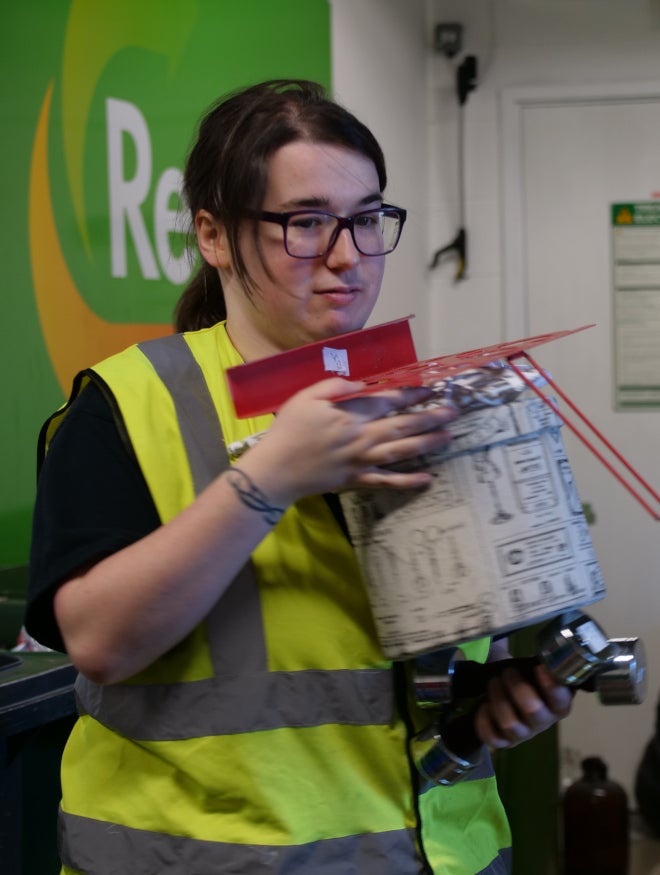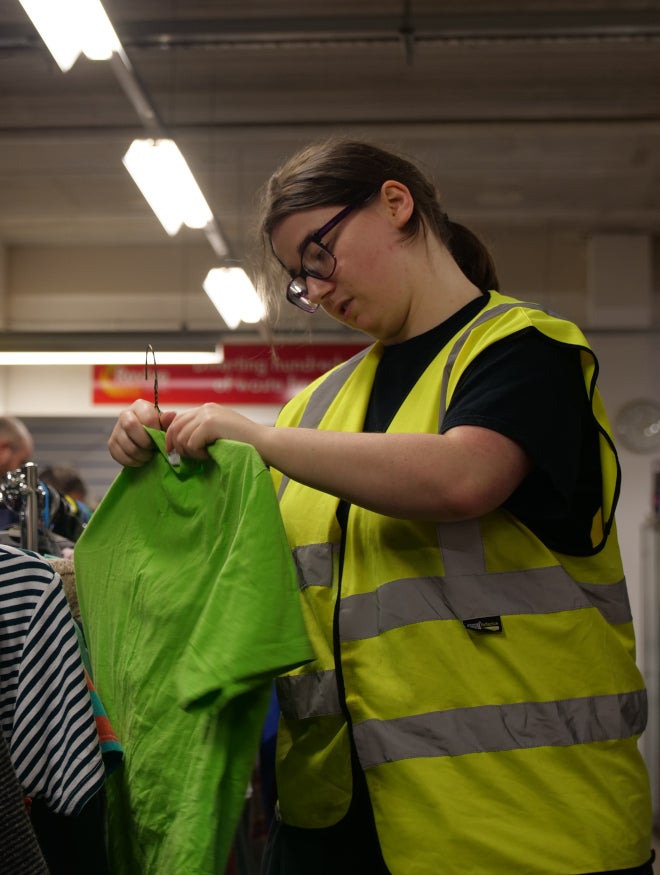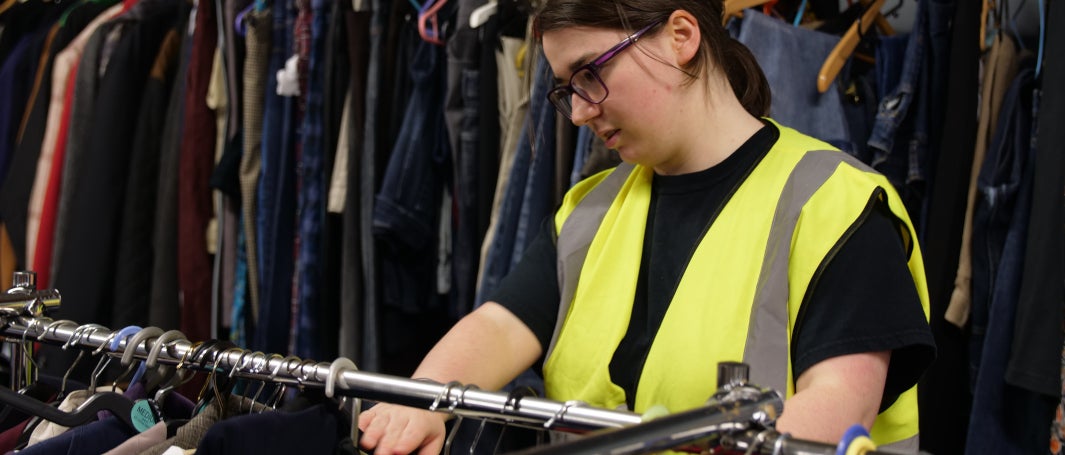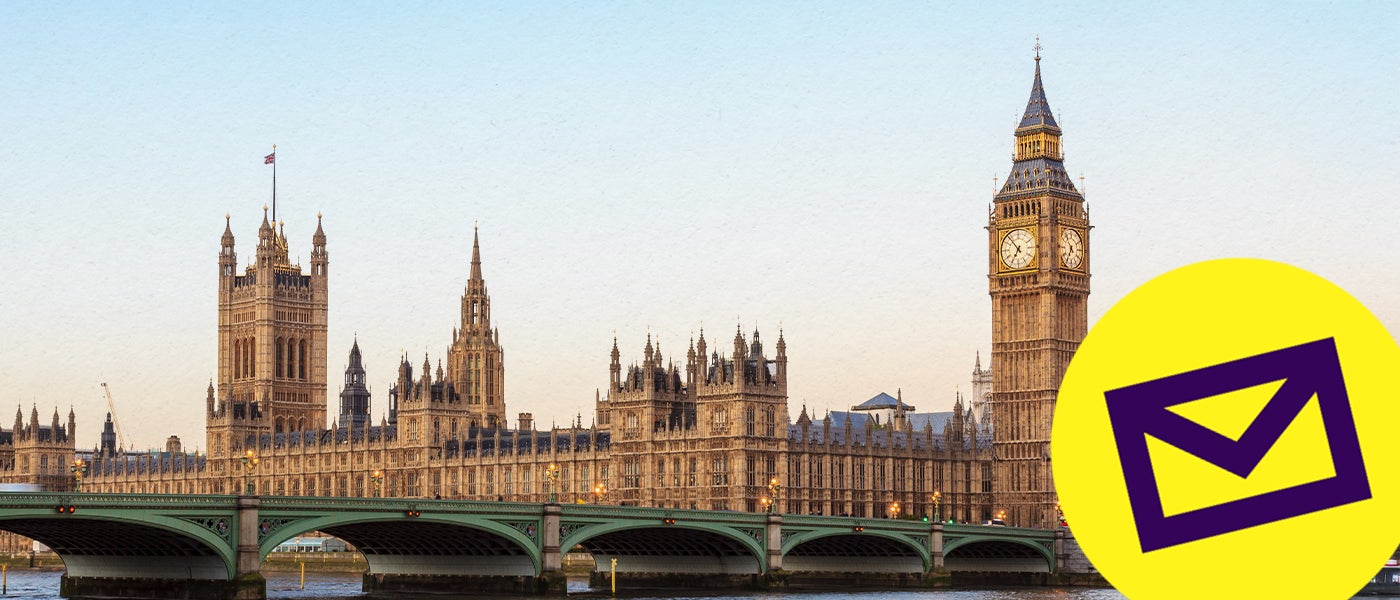- Home
- News and stories
- My job gave me confidence to connect with people
My job gave me confidence to connect with people
 1 July 2019
1 July 2019
My name is Erin. I have Asperger’s syndrome. With me, the way it manifests, is I struggle quite a lot socially. I fiddle with my hands quite a lot. I don’t like making eye contact and I struggle reading facial expressions, voice tones and body language.
This means I can say stuff and not understand why it’s inappropriate, why it could hurt someone’s feelings or be taken offensively. Also, I don’t really get when people are trying to make a joke or when they are being sarcastic, unless it’s blatantly obvious.
When I was in high school, I was told it’s very much like social awkwardness, like Sheldon Cooper from Big Bang Theory, so that’s easy to think of it that way. That’s the way someone described it to me.
Looking for work as a disabled young woman
I started looking for work when I left college for the third time. Before then, because I had my social issues, I’d had a lot of trouble at school. I'd go into offsite placements and hadn’t really known what I wanted to do at college, so I drifted from a couple of things. It was really when I was at college, and I did my volunteer placements at a couple of different charity shops, that I realised I actually do like working in retail.
I was able to develop coping mechanisms with my problems with people. I normally don’t like talking to people I don’t know, but I was able to sort my head out and think of it in a different way, to help deal with that.
I started looking primarily at working in retail-based places. It’s not easy when you don’t have a lot of experience or qualifications, because people want you to have a certain amount of experience. But you can’t get the experience until you’re employed, and it gets really repetitive and annoying.
You just start feeling like you’re all alone and no one really cares. No one likes feeling like that.
Scope helped me find employment
When I was at the job centre, we had a meeting with my work coach who mentioned Scope’s Starting Line service.
With Starting Line, you get a bunch of different help with all different areas. You get help with your interview skills, you learn a lot that I didn’t expect to learn, including legal stuff about interviews and what employers technically aren’t allowed to ask you, and when you’re filling out applications, what you don’t actually have to say.
I also learned what employers are actually looking for, which is actually a big help. Because no matter what qualifications you got at college, and no matter how much work prep you get, you’re never going to really know exactly what people want you to put on your application form and what you should or shouldn't say.
Starting Line is also good because you get to meet people in a similar situation to you. When you get knocked down, your confidence goes and you start feeling really alone and isolated. It helps because you don’t feel as isolated anymore, because you’ve met other people who have that similar situation.
So, you start to connect to people and it does boost your confidence quite a lot, which is probably the main thing I learned - how to express myself during interviews.

My job helped me grow in confidence
I’ve always had issues with my confidence. When I was in primary school, I had lots of trouble there. They just labelled me as a naughty kid. Basically, no one was interested in hearing what I’d got to say. I’d faced very similar issues in high school, and it wasn’t brilliant for people who are a bit different and who view the world differently, or think very differently.
It’s very much a case of being in a specific mould, and if you’re not in that mould, people start to not be interested. So, it does make you feel like what you say doesn’t have any value.
Confidence has always been a big issue with me.
With Starting Line, it seemed like they actually did care and I wasn’t just ignored when I had a question I wanted to ask, or if I just had something silly to say. No one really took what I said in a bad way and it helped me. That helped me get my confidence higher up.
My advice for disabled people looking for work
If you've got a disability and you’re looking for work, just keep at it. Don’t let yourself get too down. It is hard, but if you feel like your impairment does limit you in some way, talk about it. Be willing to bring it up in conversation. But also, you don’t actually have to mention having a disability in a job interview, so if you feel like you don’t want to bring it up, you don’t have to until you’ve been offered the job.
Disabled people should have the same employment opportunities
It’s important for disabled people to have equal employment opportunities because, yes, you might have some limitation - either physical or social, like me, or mental in some cases - but if you are willing to put the effort in and try hard, why shouldn’t you be allowed to work?
At the end of the day, you’re just as valuable as anyone else, but some people are uncomfortable talking about it, there is a stigma, some people don’t know the way to be around it.
Barriers disabled people face finding employment
When people think of disability, they think of wheelchairs or amputees, or the really obvious ones. The smaller, less noticeable impairments, they’re not as talked about, they are not as noticeable, so people can overlook them, like they might not understand why you said something, or are the way you are.
There’s still a stigma towards being disabled, so disabled people don’t feel very good about themselves, or feel open to talk about what they need. But if you can’t say what you need, you can’t expect someone who doesn’t know what you’ve got to understand why you need support, or be able to provide it. So, it’s on both sides. There’s a lack of understanding and a lack of willingness to talk about it.

My advice for employers worried about hiring a disabled person
If employers are worried about hiring disabled people, I’d say the simple thing is, at the end of the day, disabled people are not actually that different.
We still want to put in the effort, we’re still willing to step up. If we have a limitation, as long as an employer is willing to understand that, and - not so much make allowances - but meet you halfway, then disabled people are not going to be any different from any other employee.
With me and my impairment, if you’re willing to understand that I can sometimes need things explaining quite bluntly, and how sometimes it can take me a moment to understand how, what I’ve said has come across, I can adapt and get used to the way people talk and get better at watching what I say.
But if you’re not given the chance, you’re not going to get the opportunities.
Employers who do want to be more inclusive for disabled people, can take Scope and Virgin Media's Work With Me pledge. Taking the pledge is a way for employers to start to thinking and acting differently about disability in the workplace.
The Work With Me campaign website also has guides, tips and advice for employers looking to be more inclusive.
 1 July 2019
1 July 2019








